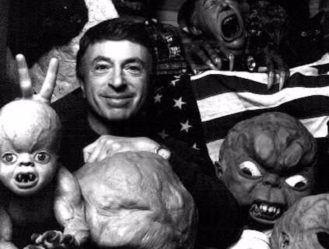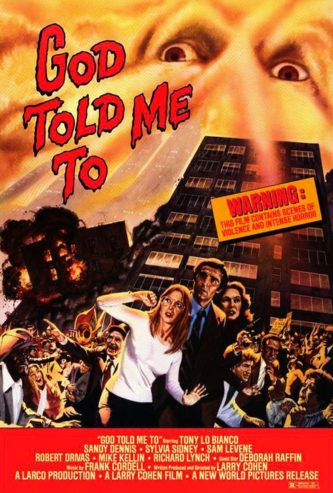 My take on the late screenwriter, producer and director Larry Cohen is a complicated one. I find there’s a great deal to admire about his films and also plenty to dislike, although on balance I feel Cohen’s is a worthwhile and even essential body of work.
My take on the late screenwriter, producer and director Larry Cohen is a complicated one. I find there’s a great deal to admire about his films and also plenty to dislike, although on balance I feel Cohen’s is a worthwhile and even essential body of work.
…Cohen’s is a worthwhile and even essential body of work.
Mr. Cohen was, first and foremost, quite a character. He was an extremely engaging speaker, and always had a wealth of great showbiz anecdotes (his DVD audio commentaries are among the finest in existence). For proof see the Cohen interviews in INCREDIBLY STRANGE FILMS, FILMMAKING ON THE FRINGE, the 2010 documentary AMERICAN GRINDHOUSE and elsewhere, and also the 2014 book LARRY COHEN: THE STUFF OF GODS AND MONSTERS, consisting of Cohen’s own highly erudite recollections about his life and career.
He was an extremely engaging speaker, and always had a wealth of great showbiz anecdotes (his DVD audio commentaries are among the finest in existence).
Cohen also deserves credit for his perseverance. Few other filmmakers of any sort would have the fortitude to maintain a fifty-plus year filmmaking career marked by an uncompromising fidelity to their own muse in addition to a cogent commercial sense. Cohen was smart enough to inject social commentary into his scripts, which got his films, grade B though most of them were, critical notice (Cohen was widely covered in the seminal Robin Wood edited academic treatise THE AMERICAN NIGHTMARE).
You may have noticed that I’ve been putting off writing about the cinematic qualities of Cohen’s films. There’s a reason for that, as he was, frankly, more interesting as a personality than a filmmaker, and his films notable for their thematic rather than aesthetic qualities.
…more interesting as a personality than a filmmaker, and his films notable for their thematic rather than aesthetic qualities.
Viewing a Larry Cohen movie, one must above all be very forgiving. His films are of the budget-lite variety, and never came close to overcoming their limited resources. A perfectionist he wasn’t, nor a cinematic innovator (having been weaned on episodic television in 1960s). Critic Rex Reed, speaking of Cohen’s Q: THE WINGED SERPENT (1982), once singled out “that great method performance by Michael Moriarty, right in the middle of all that dreck,” which is an accurate assessment; amid the skuzziness of Cohen’s films any legitimately good elements tend to stand out like the proverbial sore thumb.
It’s no surprise that Cohen was most active during the grindhouse era. His tastes were very much in synch with the grindhouse aesthetic that favored horror and Blaxploitation movies, which just so happened to be the types of films Cohen was making in the 1970s and early 80s. His fortunes declined in the late 80s and 90s, which demanded a much slicker type of moviemaking than Cohen was able to provide. It’s no surprise that most of Cohen’s later films (such as THE AMBULANCE and WICKED STEPMOTHER, neither of which is worth detailing here) went straight to video, with his final feature being 1996’s ORIGINAL GANGSTAS.
Yet Cohen’s filmography, for all its shortcomings, has a resonance missing from those of other quirky trash-meisters like Rene Daalder and Jeff Lieberman. The reasons for this include Cohen’s eye for offbeat casting, which gave us a pre-stardom Andy Kaufman as an anonymous gunman in GOD TOLD ME TO (1976) and Fred Williamson in his first-ever starring role in BLACK CAESAR (1973), in addition to the casting of ex-movie stars like Michael Moriarty, Karen Black and Judge Reinhold long after their respective Q-ratings had peaked (an area in which Cohen beat Quentin Tarantino to the punch), and also the NYC underground movie queens Zoe Temerlis and Anne Carlisle in, respectively, SPECIAL EFFECTS and PERFECT STRANGERS (both 1984).
Larry Cohen’s true secret weapon was his writing skill. It’s a fact that Cohen was writing and selling scripts for years before he became a director, and continued to do so long after his filmmaking career stalled. The man was simply a phenomenally talented scriptwriter, with an original mind, a good grasp of structure and the ability to come up with unique and arresting concepts.
Such talent is rare in the low budget film world, where bad scripting tends to be a—indeed, quite possibly the-–major shortcoming. Not so in Cohen’s flicks, even though it was often the case that the scripts were the only really good things in them. That’s true of GOD TOLD ME TO, my favorite Cohen film, which is frankly pretty clumsy in execution but has a terrifically imaginative, genre-bending, complacency-shattering script that remains without precedent over forty years later.
Other standout Larry Cohen films include the killer baby chiller IT’S ALIVE (1974), which scared the hell out of me when I first viewed it as a kid (although I’m not so horrified by it now); Q: THE WINGED SERPENT, a distinctly Cohen-ized take on classic monster movie tropes (sample dialogue: “It wouldn’t be the first time a monster has been mistaken for a god. I guess that’s why I have to kill it…”); THE STUFF (1985), which remains one of Cohen’s most potent combinations of social commentary and gross-out horror; and HELL UP IN HARLEM (1973), the outrageous kill-a-minute sequel to BLACK CAESAR. I’m also quite partial to Cohen’s screenplays for BEST SELLER (1987) and PHONE BOOTH (2001), although the films made from those scripts, directed by John Flynn and Joel Schumacher, didn’t quite do them justice.
Again, though, it was the man himself who provided the most memorable component of the Larry Cohen saga. It’s been said about John Huston that his greatest talent was for living, and the same appears to have been true for Larry Cohen. I never met him, but have heard him speak, read his interviews and seen most of his movies, and for those things I’ll always be grateful.


